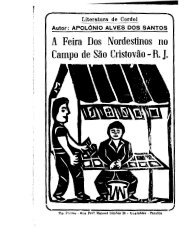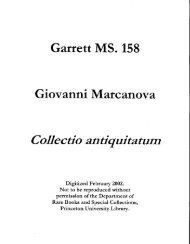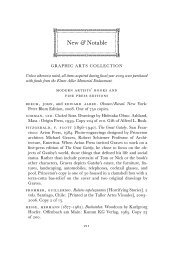You also want an ePaper? Increase the reach of your titles
YUMPU automatically turns print PDFs into web optimized ePapers that Google loves.
ments about the extent of Eliot’s influence in a critical debate that<br />
appeared to have no end, especially in Greece, and my late effort<br />
to emphasize Seferis’s originality was no doubt partly the consequence<br />
of my conversations with the poet — and certain of his<br />
astute friends — over the years. But Seferis’s unmailed letter of<br />
1956 could have provided some early authorial substantiation in<br />
this effort of a kind that his apparent reticence sought to avoid.<br />
Along with the question of Eliot’s influence and a series of exchanges<br />
about specific problems in rendering individual words and<br />
lines, the correspondence in these years raises the difficult question<br />
of tact when a poet has to deal with competing translators, all of<br />
whom are more or less friends of the poet: in this instance, besides<br />
myself, Philip Sherrard and Rex Warner. I had met Philip Sherrard<br />
for the first time several years after the two of us completed our<br />
doctoral dissertations in England on contemporary Greek poetry<br />
— in those days, as far as I know, the only graduate students working<br />
on modern Greek poetry anywhere in the world, which generated<br />
an unspoken bond between us that soon became a spoken<br />
one, lasting forty years. In the early 1950s, I had come across some<br />
translations of Cavafy that Sherrard had published in the British<br />
quarterly Encounter — very fine translations, I thought. It occurred<br />
to me then that we might collaborate in some way by bringing<br />
together a selection of translations from the poets both of us had<br />
worked on separately while writing our doctoral dissertations.<br />
This thought led to a meeting on the island of Thasos in the<br />
summer of 1955, where Sherrard was vacationing with his family<br />
and two British friends, Jack Rivas and Jeffrey Graham-Bell, all<br />
strong walkers. It was the 15th of August, feast day in the high,<br />
inland town called Panagia, and that is where Sherrard and his<br />
companions were headed when my wife Mary and I tracked him<br />
down. I joined his group for the climb to the village, and though I<br />
was the youngest of the four, I remember falling behind constantly<br />
and ending up sitting alone by the side of the road for a long<br />
interval to catch my breath, so that when I arrived in the village<br />
square, Sherrard and his friends were already well into celebrative<br />
eating and drinking and in a very congenial mood. Our collaboration<br />
was sealed over the second bottle of raki, an easy sealing because<br />
we agreed then and there to create an anthology of translations<br />
simply by bringing together what he had on hand of Cavafy and<br />
377















